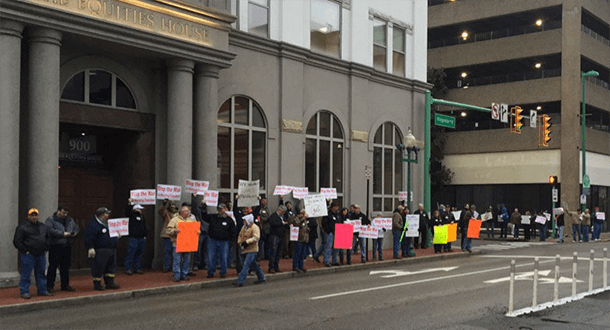
Overriding vetoes of Gov. Earl Ray Tomblin, anti-union legislators passed a “right-to-work” law that will make it more difficult for unions to bargain for better wages, benefits and working conditions.
More than 100 protesters lined city streets near the capitol building during rush hour chanting “Right to work is wrong!” and carrying signs that said, “Stop the War on Working Families.” Their protest fell on deaf ears, unfortunately, thanks to a legislature that seems led by issues supported and sponsored by the Koch brothers.
Lots of money flowed through the Koch-brother-funded Americans for Prosperity, which set up a West Virginia chapter with right-to-work legislation at the top of its agenda. The group aired television ads, sent out mailers, canvassed neighborhoods and coordinated phone calls to legislators in support of the bill.
Senate Pres. Bill Cole, who wants to ride the Koch gravy train to the West Virginia governor’s mansion, was the bill’s main sponsor and presided over a one-vote victory for the bill in the state Senate, with every Republican voting for it and every Democrat voting against. Just weeks prior, Cole spoke at a weekend retreat in Palm Springs, California, organized by Charles and David Koch. The retreat requires an annual membership fee of $100,000, and the event is not open to the public, only to major right-wing donors.
Even while protesters rallied and union members and allies feverishly lobbied legislators, the bill was fast-tracked through the Legislature’s two-month session, passing through committee hearings, floor debate and final votes in just three weeks – giving the Legislature enough time to override an anticipated veto. Sen. Robert Karnes (R) even mocked union members in attendance during the bill’s debate on the Senate floor.
In other states where right to work has passed in recent years, anti-union legislators predicted big gains in employment and economic growth. But the opposite is occurring. In Indiana, for example, Carrier (an HVAC company) just sent 2,100 jobs to Mexico after making a $6 billion profit last year.